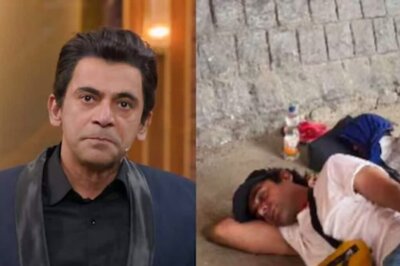
views
Tehran: Iran's opposition staged protests against the government on Monday despite warnings from the Interior Ministry that demonstrators would be confronted by police.
The opposition, led by former prime minister Mir-Hossein Moussavi and ex-parliament speaker Mehdi Karroubi, had applied for permits to demonstrate in support of popular uprisings in Egypt and Tunisia.
The government rejected the request, saying any support for Egypt and Tunisia could have been shown by participating in state-run rallies on Friday's 32nd anniversary of Iran's Islamic Revolution.
The government accused the opposition, also known as the "Green Wave", of trying to use the developments in Egypt as a pretext to continue its own protests against the establishment in Tehran.
According to opposition websites, gatherings were held in several districts in western Tehran but the protesters refrained from shouting slogans so as to not provoke police. According to witnesses, police and anti-riot forces were deployed in numerous districts and tried to prevent any opposition action and dispersed small crowds.
An Interior Ministry general director reiterated Monday that no permission had been granted for any gatherings.
In some parts of Tehran, cellular phone systems were said to have been cut off, but the internet was still working.
Opposition websites reported the arrests of at least 18 dissidents. The Tehran prosecutor's office confirmed some of the arrests on charges of security breaches.
Karroubi claimed to have been placed under house arrest since Thursday to prevent him from being involved in any rallies, and opposition websites also reported Monday that Moussavi has been put under house arrest. According to the yet-unconfirmed reports, both the telephone lines and cellular service for Moussavi were cut and police blocked the alley in downtown Tehran where the former prime minister resides.
Arrangements for Monday's protests were made using the social-networking website Facebook, which despite being blocked in Iran can be accessed through proxy servers. Iranian Facebook users wrote that Iranian officials should have a look at former Egyptian president Hosni Mubarak and guard against having the same fate.
Some analysts said police confrontations with demonstrators would contradict the Iranian government's support for the protesters in Egypt and Tunisia and put the government in an embarrassing position.
The opposition protests in Iran started after the June 2009 presidential election, which was overshadowed by fraud charges. The opposition does not acknowledge President Mahmoud Ahmadinejad's re-election.
Dozens of demonstrators were killed in the protests, and a score of former reformist officials, journalists, students and activists were jailed.




















Comments
0 comment